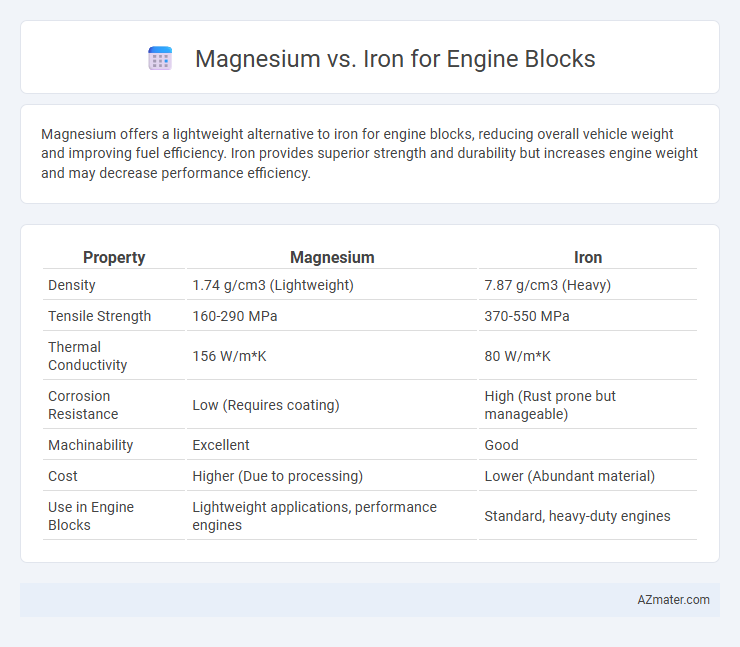Magnesium offers a lightweight alternative to iron for engine blocks, reducing overall vehicle weight and improving fuel efficiency. Iron provides superior strength and durability but increases engine weight and may decrease performance efficiency.
Table of Comparison
| Property | Magnesium | Iron |
|---|---|---|
| Density | 1.74 g/cm3 (Lightweight) | 7.87 g/cm3 (Heavy) |
| Tensile Strength | 160-290 MPa | 370-550 MPa |
| Thermal Conductivity | 156 W/m*K | 80 W/m*K |
| Corrosion Resistance | Low (Requires coating) | High (Rust prone but manageable) |
| Machinability | Excellent | Good |
| Cost | Higher (Due to processing) | Lower (Abundant material) |
| Use in Engine Blocks | Lightweight applications, performance engines | Standard, heavy-duty engines |
Introduction to Engine Block Materials
Engine blocks commonly use magnesium and iron due to their distinct mechanical properties and weight considerations. Magnesium alloys offer significant weight reduction, enhancing fuel efficiency and handling in automotive applications, while iron, particularly cast iron, provides superior strength, durability, and thermal conductivity critical for high-performance engines. Understanding the balance between magnesium's lightweight advantage and iron's robustness is essential for optimizing engine block design and performance.
Overview of Magnesium Alloys
Magnesium alloys are prized in engine block manufacturing for their exceptional lightweight properties, offering a density approximately 35% lower than aluminum and significantly reducing overall engine weight to improve fuel efficiency. These alloys exhibit high strength-to-weight ratios and excellent thermal conductivity, enhancing heat dissipation during engine operation while maintaining structural integrity under stress. Magnesium's natural vibration dampening characteristics and corrosion resistance when alloyed properly contribute to increased engine block durability and performance in automotive applications.
Properties of Iron in Engine Blocks
Iron exhibits exceptional strength and durability, making it a preferred material for engine blocks that must withstand high thermal and mechanical stress. Its excellent wear resistance ensures longevity under continuous friction and heat cycles, contributing to consistent engine performance. Furthermore, iron's superior machinability and heat dissipation properties enhance engine block precision and reliability during operation.
Weight Comparison: Magnesium vs Iron
Magnesium engine blocks weigh approximately 33% less than iron blocks, offering significant reductions in overall vehicle weight and improved fuel efficiency. The density of magnesium is about 1.74 g/cm3 compared to iron's 7.87 g/cm3, making magnesium roughly one-fifth the weight of iron for the same volume. This weight difference plays a crucial role in enhancing performance by reducing unsprung mass and improving handling dynamics.
Thermal Conductivity and Heat Management
Magnesium engine blocks offer superior thermal conductivity, approximately 156 W/m*K, compared to iron's roughly 80 W/m*K, enabling faster heat dissipation and improved engine cooling efficiency. This enhanced heat management reduces thermal stresses and promotes consistent operating temperatures, which can prolong engine life and performance. However, magnesium's lower melting point and higher corrosion susceptibility require advanced alloying and coatings to maintain durability under high thermal loads.
Corrosion Resistance and Durability
Magnesium engine blocks offer excellent corrosion resistance due to the formation of a protective oxide layer, reducing the risk of rust compared to iron. Iron engine blocks, while highly durable and capable of withstanding extreme mechanical stress, are more prone to rust and require additional coatings or treatments to prevent corrosion. Balancing corrosion resistance and durability, magnesium is favored for lightweight, corrosion-resistant applications, whereas iron remains preferred for heavy-duty durability and wear resistance.
Manufacturing and Machinability Considerations
Magnesium alloys offer significant weight reduction and excellent machinability compared to iron, making them ideal for high-performance engine block manufacturing where efficiency is critical. Iron, particularly cast iron, provides superior strength, wear resistance, and thermal stability, which are essential for durability in heavy-duty engines despite its higher density and machining challenges. Manufacturing processes for magnesium require controlled environments due to flammability risks, whereas iron benefits from established casting and machining techniques but involves longer cycle times and increased tool wear.
Performance in Automotive Applications
Magnesium engine blocks offer superior weight reduction compared to iron, enhancing vehicle acceleration and fuel efficiency in automotive applications. Iron engine blocks provide exceptional strength and durability, supporting high-performance engines under extreme thermal and mechanical stresses. The choice between magnesium and iron depends on balancing lightweight design goals with the need for structural integrity and heat resistance in high-performance engines.
Cost Analysis: Magnesium vs Iron Engine Blocks
Magnesium engine blocks offer significant weight reduction compared to iron, which translates to improved fuel efficiency but come at a higher raw material cost and increased manufacturing complexity. Iron engine blocks are more affordable due to widespread availability, lower material cost, and established fabrication processes, making them cost-effective for mass production. While magnesium provides performance benefits, iron remains the economical choice for engine blocks when prioritizing budget constraints.
Future Trends in Engine Block Materials
Magnesium offers significant weight reduction advantages over iron, contributing to improved fuel efficiency and lower emissions in engine block manufacturing. Future trends indicate a growing shift towards magnesium alloys enhanced with advanced coatings and composite reinforcements to overcome durability and thermal stability limitations traditionally associated with iron engine blocks. Innovations in hybrid material structures and additive manufacturing are expected to accelerate the adoption of lightweight magnesium engine blocks in electric and hybrid vehicles, aligning with global sustainability goals.

Infographic: Magnesium vs Iron for Engine Block
 azmater.com
azmater.com